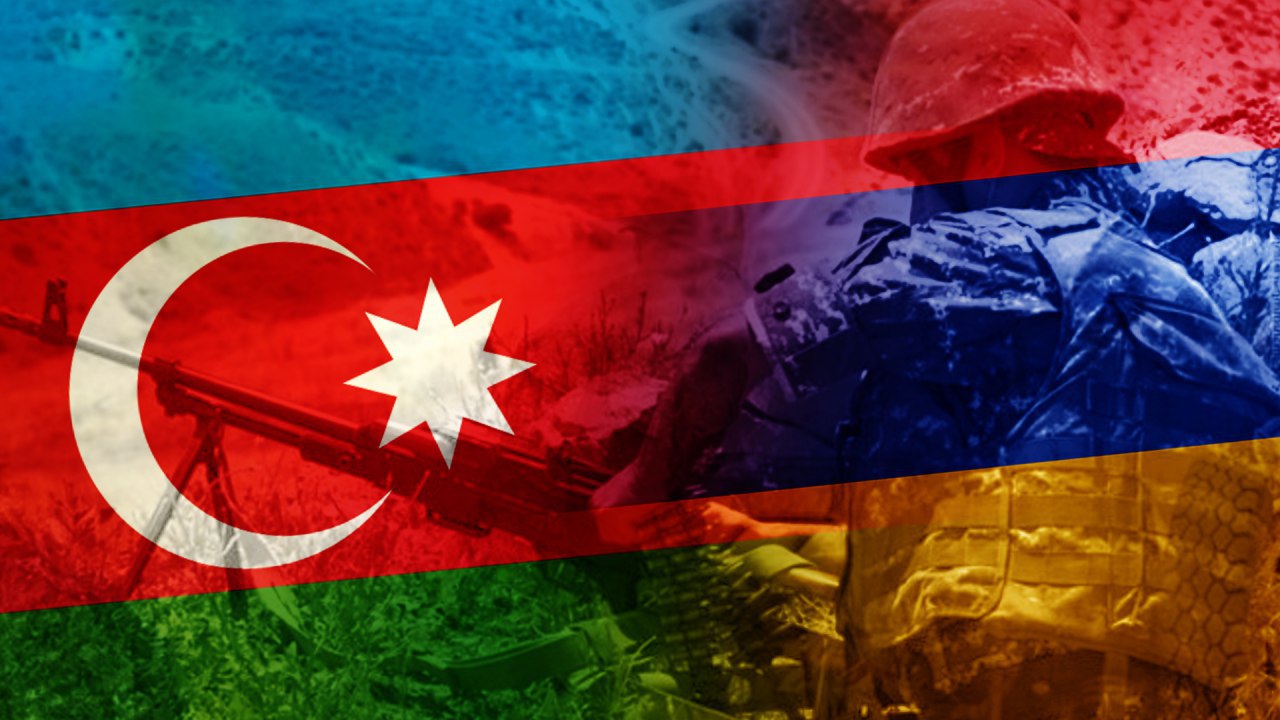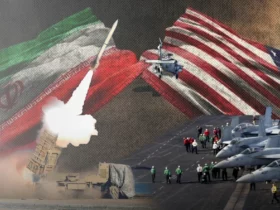On the night of November 10, Presidents of Azerbaijan and Russia Ilham Aliyev and Vladimir Putin along with Armenian Prime Minister Nikol Pashinyan signed a joint statement on the complete cessation of hostilities in Nagorno-Karabakh. According to the document signed, military operations in Nagorno-Karabakh will cease. The parties remain in their positions, but Armenia will cede to Azerbaijan all previously occupied districts around Nagorno-Karabakh proper.
Azerbaijan’s victory
De facto, the agreement signed by Aliyev, Putin and Pashinyan is recognition of Azerbaijan’s victory. Azerbaijan will maintain control over Shusha and other liberated territories and will receive the areas of 7 occupied districts.
One of the most important conditions of the current agreement is that Russian peacekeepers will be brought into the region. They will be deployed along the line of contact between Azerbaijani and Armenian forces in Nagorno-Karabakh and along the corridor connecting Nagorno-Karabakh with Armenia. All previously blocked transport routes should be unblocked. This means that the Nakhchivan Autonomous Republic of Azerbaijan will restore full communication with the main territory of Azerbaijan.
The return of Azerbaijani refugees to Nagorno-Karabakh and adjacent areas is an important achievement. Internally displaced persons and refugees will return to Nagorno-Karabakh and adjacent areas under the control of the UN High Commissioner for Refugees.
According to Azerbaijani President Ilham Aliyev, Turkish peacekeepers will also be present at the peacekeeping center to be deployed in Nagorno-Karabakh, and Turkey will play a special role in controlling the truce.
Can Armenia save face?
The signing of the agreement sparked mass protests in Yerevan. The crowd stormed Prime Minister Pashinyan’s residence and parliament and severely beat Parliament Speaker Ararat Mirzoyan. Opposition parties are already saying the country should reject the agreement.
Nevertheless, given the situation, the Armenian side also stands to benefit from the agreement. If the agreement had not been signed, Armenia would have been subjected to an even more humiliating defeat and could potentially have lost all of Nagorno-Karabakh. Moreover, the restoration of transport communication, which is mentioned in the signed document, also concerns the part of Armenia that is now under Azerbaijani blockade: Armenia may finally begin to develop these areas. The South Caucasus countries, if the agreement is implemented, will be able to restore the economic ties that were destroyed with the collapse of the USSR and Nagorno-Karabakh conflict.
In fact, the current agreement repeats in general the proposals that were already proposed to Armenia within the framework of the OSCE Minsk Group, with the exception of Azerbaijan’s control over Shusha. Armenia could have avoided the war and would have been in a much better position if it had made concessions to Azerbaijan that had long been agreed upon. Moreover, during the war, Azerbaijani President Ilham Aliyev repeatedly stated his readiness to stop the fighting if Armenia presented a timetable for withdrawing its troops from the occupied territories of Azerbaijan.
However, Armenian Prime Minister Nikol Pashinyan, who came to power as a result of a pro-Western color revolution, refused to offer peace and drove his country into a desperate situation.
The victory of Azerbaijan is a victory for Turkey
Azerbaijan could not have won such a convincing victory on the battlefield without the support of Turkey. Turkish military aid, especially drones, turned the tide of the war in favor of Azerbaijan. This experience will undoubtedly result in strengthening Turkish-Azerbaijani relations.
President Erdoğan and Azerbaijani President Aliyev congratulated each other on their brilliant victory in the Karabakh war. (https://aydinlik.com.tr/haber/erdogan-ile-aliyev-gorustu-222967).
Turkish Minister of Foreign Affairs Mevlüt Çavuşoğlu congratulated Azerbaijan on the victory:
“Azerbaijan made a significant gain on the field and on the table. I heartily congratulate this blessed success”. Cavusoglu stated that Turkey will always support “our Azerbaijani brothers”.
Although Turkey is not a party to the tripartite agreement on Nagorno-Karabakh, it is clear that issues in the region will no longer be resolved without Ankara.
Ilham Aliyev’s words about Turkish peacekeepers confirm this. For Azerbaijan, the Turkish peacekeepers are the guarantor of Baku’s interests. Russia already has experience of cooperation with Turkey in a similar format in Syria. It is also a positive step for Russia to accept Turkish observers in the region.
For now, Russia claims that only Russian peacekeepers will be in the region (https://aydinlik.com.tr/haber/rusya-disisleri-karabag-a-yalnizca-rus-baris-gucleri-yerlestirilecek-222962). This does not mean, however, that there will be no Turkish military personnel in the region who can legally obtain observer status.
All the more so because no one can prevent Azerbaijan from inviting Turkish troops to the territories already under Baku’s control.
As media reports “President Recep Tayyip Erdoğan, Aliyev discussed setting up a joint Russian-Turkish peacekeeping center to monitor the Nagorno-Karabakh cease-fire”. (https://www.dailysabah.com/politics/diplomacy/turkey-may-send-peacekeeping-forces-to-nagorno-karabakh-talks-continue).
It is not the presence of Turkish militaries in the region that is disputed, but their legal status: whether or not they are peacekeepers, observers, or something else.
Turkey’s possible role in overseeing the ceasefire will require even closer cooperation with Russia.
Possible provocations
The agreement between Russia, Armenia and Azerbaijan means abandoning the previous format of the Nagorno-Karabakh conflict settlement, where in addition to Russia, the US and France were to play a special role as co-chairs of the Minsk Group.
Russia has maintained its position and initiated and guaranteed new agreements. The US and France were unable to offer anything and took a frank pro-Armenian stance at the very beginning of the conflict, which was unreasonable because of Azerbaijan’s military advantage. As a result, Paris and Washington lost, while Turkey and Russia proved to be the powers that had shown that the future of the region depended on them.
However, it is certain that external forces will try to undermine the new format and to push Turkey and Russia against each other in order not to lose their positions in the region.
This primarily concerns Armenia, where Western imperialists can take advantage of the revanchist sentiments. However, Armenians should remember that it was the pro-Western politician Pashinyan who led Armenia to defeat.
Another format for potential Atlantist influence is to enact provocations. The latest incident with a Russian helicopter shot down near the border with Nakhichevan on November 9 (Azerbaijan immediately admitted responsibility and stated that the helicopter was shot down by mistake), demonstrates that such dangers are great. Targeted provocations and tragic accidents will be used both against Russia and against Turkey (since Turkish military will be in the region).
Those elements inside Russia, Turkey, Armenia and Azerbaijan which are inclined to revenge, unilateral actions, a policy of threats and putting pressure on the participants of the peace process without taking into account the Atlanticist factor, may also act as “useful idiots” for the West.
Nagorno-Karabakh is becoming another point (like Syria and Libya) where Turkey and Russia are at the forefront and are building a complex balance of power. On the one hand, this is a positive development, as Ankara and Moscow are replacing imperialist Western powers, the former conductors of the unipolar world.
On the other hand, the more regions such as these which exist, the more likely a conflict between Turkey and Russia may emerge over one of them. Such a conflict would almost certainly affect both powers negatively and would be in the interests of the West.
The new front of interaction (and, in the event of negative developments, confrontation) in the South Caucasus requires wisdom and restraint on the part of the Turkish and Russian leaders. There is a need to institutionalize the partnership and for both sides to strengthen confidence-building measures and to refuse to support subversive elements.

















Leave a Reply